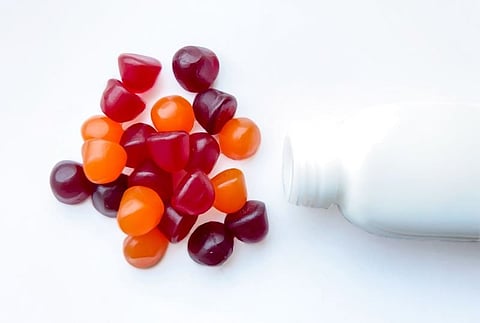TUESDAY, April 16, 2024 (HealthDay News) -- In the wake of a sharp rise in the number of young children accidentally eating melatonin supplements, an industry group has called for tougher safety guidelines for packaging and labeling the sleep-aid supplements.
Companies have 18 to 24 months to voluntarily add child-deterrent packaging and improve warning language on the labels of over-the-counter melatonin products, the Council for Responsible Nutrition (CRN) said Monday in a news release announcing the more stringent guidelines.
The new guidelines also stress the need for manufacturers to adopt child-safe bottles for gummies and chewable tablets.
"With the growing popularity of gummy dietary supplements among consumers of all ages, CRN’s new guidelines for [melatonin] gummy supplements specifically address the unique aspects of these products," the council said in its statement. "The new recommendations focus on labeling clarity, reducing unsupervised access by children, addressing potential choking hazards for small children and ensuring products are used as intended."
Experts welcomed the move.
“What’s significant here is that the industry recognizes that melatonin supplements do pose serious risks -- particularly to children -- and that the industry needs to do a much better job at ensuring the products are safe and well-manufactured,” Dr. Pieter Cohen, an associate professor of medicine at the Cambridge Health Alliance in Massachusetts who authored a 2023 study on the dangers of melatonin gummies, told CNN.
“Whether this voluntary recommendation will be followed is another matter entirely, and we’ll need to see,” Cohen added.
Cohen's study found that 25 products labeled as melatonin gummies contained dangerous levels of the hormone. One over-the-counter product contained up to 347% more melatonin than listed on the label, while another contained no melatonin at all because it was entirely composed of cannabidiol (CBD).
Meanwhile, a March 2024 report from the U.S. Centers for Disease Control and Prevention discovered that some 11,000 children had been seen in emergency rooms between 2019 and 2022 after ingesting melatonin while unsupervised. Melatonin gummies were involved in nearly 5,000 of these cases.
More than half of the accidental ingestions involved children between the ages of 3 and 5, the agency added. About three-quarters of the cases involved bottles that young children were able to open or bottles that weren't closed properly.
Melatonin use can be especially dangerous in children and should only be used after consulting a pediatrician, experts say.
Melatonin is a hormone produced by the brain in response to darkness. It regulates the body’s natural sleep-wake cycle. While the U.S. Food and Drug Administration regulates both dietary supplements and dietary ingredients, the agency does so under a different set of regulations than those covering "conventional" foods and drugs.
The new council guidelines call for labels that warn consumers about the danger of drowsiness after taking a melatonin supplement and state they should not be taken with alcohol. In addition, the labels should tell purchasers that melatonin is intended for intermittent or occasional use only.
More information
The National Institutes of Health has more on melatonin supplements.
SOURCE: Council for Responsible Nutrition, news release, April 15, 2024; CNN


